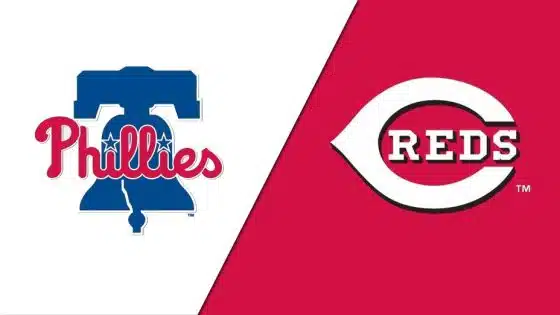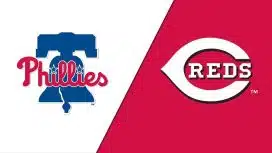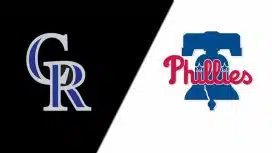By Matt Albertson and Rebecca Serad, Sports Talk Philly Staff
The Phillies welcomed the Los Angeles Dodgers to Citizens Bank Park on August 16, 2016 in a matchup of clubs with nearly palindrome records. But that's not why I bought a ticket. I bought a ticket to see Chase Utley return to Philadelphia for the first time since being traded to the Dodgers the year before. The ~28,000 other people who showed up to the south Philly ballpark that night likely attended for the same reason. I remember it vividly – Utley led off the game and Phillies PA announcer Dan Baker announced Utley as he walked to the plate as Led Zepplin's song Kashmir thundered over the sound system and throughout the stadium; the stadium rocked with applause in an over two minute ovation.
Once the ovation ended (more like quieted), Utley struck out looking on a called third strike, which was also followed by a resounding applause. After flying out to left field in the 3rd, Utley hit a home run in the 5th to deep right-center field and the stadium again erupted. The stadium buzzed again when Utley stepped to the plate in the 7th inning with the bases loaded and exploded when the veteran second baseman took reliever Michael Mariot deep over the right field fence for a grand slam.
This kind of attention and adoration doesn't happen often for opposing player, especially in Philadelphia. But Utley was special. He was easily the most popular Phillies second baseman since Mickey Morandini or Dave Cash and played the game with a Pete Rose style grit and a statuesque persona that beloved himself to Philadelphia's blue collar sports fans.
Originally drafted by the Los Angeles Dodgers in 1997 but didn't sign, the Phillies drafted Utley 15th overall in the 2000 MLB draft. He made his first MLB appearance on April 24, 2003 and in his second major league at-bat, crushed an Aaron Cook pitch to deep right field for a grand slam, directly over current Phillies manager Gabe Kapler's head, then playing right field for Colorado.
From there, Utley established himself as one of the best second baseman in baseball. His 35-game hitting streak in 2006 was the second longest in franchise history and tied Luis Castillo for the longest hitting streak by a second baseman. Utley represented the Phillies in the All-Star Game six times (2006-2010, 2014), and ranked in the top 15 of National League MVP voting in five consecutive years (2005-2009). In 2009, he was named as the second baseman on Sports Illustrated's MLB All-Decade Team.
Utley was dubbed “The Man” by Hall of Fame broadcaster Harry Kalas. On August 9, 2006 versus the Atlanta Braves, Utley was on second base following a bases-clearing double to left-center field. Utley scored from second on a chopper back to the pitcher by Ryan Howard to extend the Phillies' lead. That kind of aggressive, heads-up play would define Utley as a player, as well as endear him to Phillies fans.
Career Accomplishments
- Six-time National League All-Star
- Four-time Silver Slugger Award Winner
- Over 1,600 hits
- Sixth in Phillies franchise history in home runs
- Seventh in Phillies franchise history in RBIs
- Fifth in Phillies history in doubles
- Seventh in Phillies history in extra-base hits
- Sixth in Phillies history in runs scored
- All-time Phillies franchise leader in being hit by pitches
- Hit five home runs during the 2009 World Series
- 2008 World Series Champion
*Awards were not factored into the formula
Career-Defining Moment
While there are plenty of options for Utley's top moment with the Phillies, his heads-up play in Game 5 of the 2008 World Series tops them all.
The Tampa Bay Rays had a runner on second with two outs in the top of the seventh inning, and a hit would give them the lead. Utley fielded a grounder up the middle, faked a throw to first, and then threw the runner out at home for the final out. If he hadn't made this play, the Phillies may not have won that game, or the World Series. This was Utley at his finest.
Reasoning for ranking
Utley scored 41 points in our formula. He totaled 65.4 WAR, averaging 4.36 WAR over his 15 seasons. He had 12 seasons of 2+ WAR and six seasons at 5+ WAR, and two seasons at 8+ WAR totaling 40 points. His 401 doubles ranks 181st all-time, totaling one point.
Ashburn scored an 8 out of 10 on our subjective importance scale because he was a critical piece to the greatest Phillies teams in history between 2007 and 2011 and was the sole offensive spark for a lineup that had otherwise cooled off during the 2009 World Series, tying Reggie Jackson's 1977 World Series home run record of five.
Explanation of scientific formula
The player rankings formula combines both traditional and advanced statistics/metrics and assigns a point total to each category.





